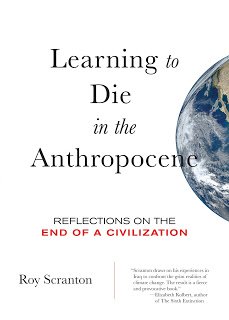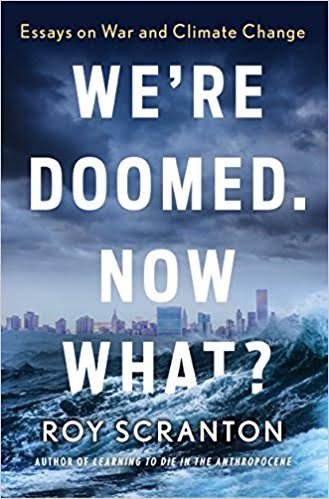Roy Scranton, is the award-winning author of five books, including Learning to Die in the Anthropocene: Reflections on the End of a Civilization, Total Mobilization: World War II and American Literature, and We’re Doomed. Now What? He has written for the NYTimes, Rolling Stone, The Nation, and other publications. He was selected for the 2015 Best American Science and Nature Writing, has been awarded a Whiting Fellowship, a Lannan Literary Fellowship, and other honors. He’s an Associate Professor of English at the University of Notre Dame, and is director of the Notre Dame Environmental Humanities Initiative.
ROY SCRANTON
It seems irresponsible to me to downplay the possible consequences of climate change. It seems irresponsible to assume that we're going to fix it. And so I think it's absolutely a responsibility for the people who are talking about it and thinking about it, to look at the worst-case scenario and to look at the current trajectories, absent technologies for carbon scrubbers, to look at where we're actually headed, the worst-case scenarios, and address that and bring that to each other and to our children and to our students. When you really look at the situation, it's scary and terrifying, and it upends everything that we've been told to make sense of life... The second part of what I think being a mentor or being a parent or being an adult or a teacher with regard to climate change means helping younger people sit with the terror, sit with the grief, the sense of unknown, and not push it away and not repress it and not try to find a way to just move past it without dealing with it, but to really inhabit that space of unknowing and fear and grief because that's the reality that we live in.
*
In terms of human wealth and general quality of life as measured in numerical terms, the costs for that are also manifest and have largely been externalized, if not necessarily into the environment, where they often are, they're also externalized into the future, which is to say, yes, there is this huge surge in human population and relative wealth and so on and so on, but there is absolutely no reason to believe that it's sustainable into the future, especially not infinitely. Infinite growth is impossible. It's just not physically possible.
*
Capitalism and technological innovation have brought a higher standard of living and greater health to the people of the world. That's inarguable. That's absolutely true. It's a combination of capitalism, imperialism, and technological innovation that have raised all boats in their way and increased standards of living and so on. People like Stephen Pinker make this argument. There are various kinds of Just So Stories about how we're all better off now because of capitalism and technological development than humans were in 1784. The thing that all these stories ignore, however, is two things. One is that this trendline parallels various other trend lines that measure our devastation and exploitation of the earth. This trendline is real, right? In terms of human wealth and general quality of life as measured in numerical terms. The costs for that are also manifest and have largely been externalized.
Photo by Ola Kjelbye
This interview was conducted by Mia Funk and Sarah Qadir with the participation of collaborating universities and students. Associate Interviews Producer on this podcast was Lauren Chineme. Digital Media Coordinators are Jacob A. Preisler and Megan Hegenbarth.
Mia Funk is an artist, interviewer and founder of The Creative Process & One Planet Podcast (Conversations about Climate Change & Environmental Solutions).


















































































